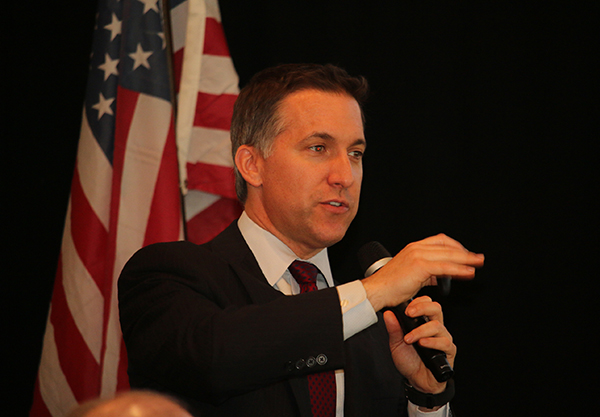Palm Beach County State Attorney Dave Aronberg was the guest speaker at the Wellington Chamber of Commerce’s installation luncheon held Wednesday, March 29 at the International Polo Club Palm Beach.
Aside from delivering remarks, Aronberg also installed the chamber’s board for 2017-18.
Aronberg described the heroin/opioid epidemic, along with shady sober home operators, as “the No. 1 criminal justice issue facing Palm Beach County and, in my opinion, the State of Florida.”
Prescription drug deaths have increased dramatically in recent years, he said.
“This situation is where it is because of federal and state laws,” he said. “The government enabled this to happen. It can be fixed. This was not inevitable. It was preventable. But well-intended federal laws created this mess. State laws were so weak. So you have a combination of powerful, well-intended federal laws that have been exploited by bad people to create this, combined with very weak state laws with a legislature that has been indifferent toward this crisis.”
The problem, Aronberg said, is a Florida phenomenon, not just a Palm Beach County problem. Because of the task force that has been created, Palm Beach County is a leader in the fight against sober home and treatment center abuses, he said, citing 21 arrests.
“We’ve been cleaning up this industry, but we still have a ways to go,” he said. “But we are a leader in this fight. If it wasn’t a statewide problem then, it is a statewide problem now.”
As those abusing the system are forced out of Palm Beach County, Aronberg explained, they will go to another county or quit the business, which is unlikely.
“The legislature needs to be prepared, and they need to look at us as a role model,” he said.
Aronberg traces the current problem to a gateway drug that got many people addicted to opioids. When Oxycontin first came out, he explained, it was sold as though it was Advil.
“This was preventable,” Aronberg said. “A company flooded the market with this new opiate that got people hooked, innocently, and then they started dying in record numbers.”
In 2010, there were 1,516 deaths from oxycodone, the generic form of Oxycontin, alone. Benzodiazepines accounted for 1,304 deaths, methadone accounted for 694 deaths, alcohol accounted for 572 deaths and cocaine accounted for 561 deaths in 2010.
Heroin use, however, was dropping. But, Aronberg explained, if Oxycontin decreased, heroin use would increase. “In 2010, Oxycodone was the No. 1 drug killer,” he said.
At that time, Aronberg discovered that there were more “pain clinics” in Florida than McDonald’s franchises. Newly elected Attorney General Pam Bondi reached out to Aronberg to help combat the pill mill epidemic that was supplying the Oxycontin.
During the first six months of 2010, Florida practitioners purchased 41,285,772 Oxycodone pills. For reference, Ohio, the next highest state, had just over a million pills purchased. All of the other states, not including Florida, purchased just under 5 million pills.
Bondi was able to persuade the legislature to pass prescription drug monitoring, and Oxycodone deaths began to steadily decrease.
“All it took was government action. All it took was one year for it to drop,” Aronberg said. “As we’re seeing this drop, I kept warning people, ‘Watch heroin.’”
Heroin is a substitute for opiate pills and is 33 times more powerful than morphine.
“Heroin has now far surpassed Oxycodone in Palm Beach County,” Aronberg said. “Every day in Palm Beach County, there are 25 people who are overdosing.”
In 2015, there were 372 opioid deaths: 13 from hydrocodone, 16 from methadone, 47 from oxycodone, 48 from morphine, 90 from fentanyl and 158 from heroin.
In 2016 alone, there were more than 5,000 calls to Palm Beach County Fire-Rescue where the anti-overdose drug Narcan was administered. In just the first three weeks of November, one hospital reported more than 300 overdose visits.
The problem with sober homes is three-pronged: no registration, certification or qualifications are necessary, Aronberg explained. Someone purchases a home or rents it, and calls it a sober home. What is illegal is when money changes hands between marketers, labs, substance use disorder patients, detox and inpatient treatments, sober homes and outpatient treatments. Sober homes offering free rent and other amenities are getting kickbacks that far outweigh what they could charge for rent.
Once a patient is sober, the person no longer has the treatment, home and support, and it is incredibly easy, and convenient, to become a substance use disorder patient, causing a never-ending cycle.
“Under federal law, you cannot be denied for a preexisting condition. There is no limitation on how many times you can go through this. Federal law does not incentivize recovery. This is supposed to be a recovery model; it is a relapse model,” he said. “The incentive is to relapse… And so the cycle continues until the person leaves South Florida in a body bag.”
With sober homes across the state, and increasing deaths from overdose, there is an undeniable problem — and Tallahassee needs to step in to help solve it, Aronberg said.
In other business:
• Executive Director Michela Green introduced the new executive board, which was installed by Aronberg: President Debbie Crompton, President-Elect Michael Ferreira, Vice President Stuart Hack, Secretary Blanca Greenstein and Treasurer Dale Grimm. The board of directors includes Lisa Banionis, Scott Harris, Dr. Andrew Savin, Roxanne Stein and Kathryn Walton.
• Green pinned Henry Mosley of HNM Menswear, welcoming him to the President’s Circle.
• The next chamber event is the Flavors Wellington Food + Wine Festival, which returns to the Palm Beach International Equestrian Center on Friday, April 7 from 6:30 to 9:30 p.m. For more info., visit www.wellingtonchamber.com.
ABOVE: State Attorney Dave Aronberg discusses the opioid epidemic.








